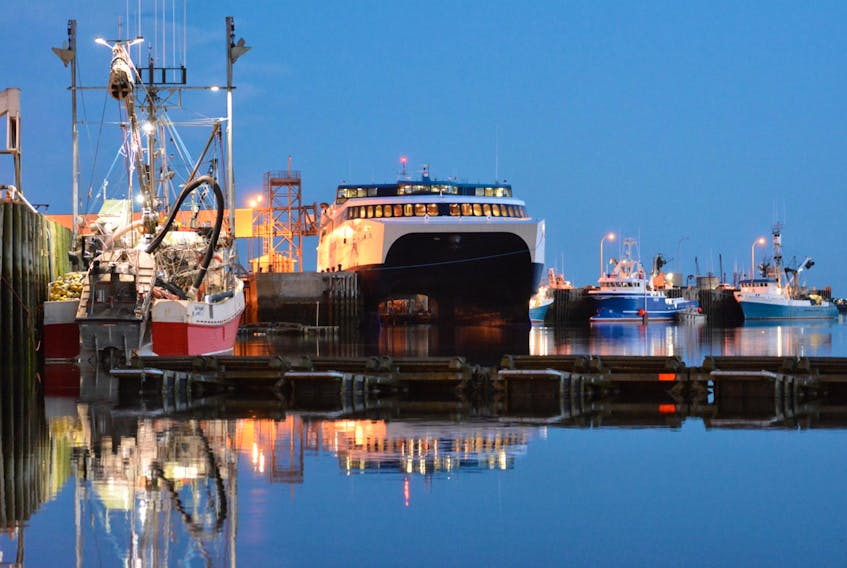Bay Ferries’ Cat ferry service between Yarmouth and Bar Harbor is targeted to begin June 21.
The later start to the season this year compared to last year – when the season started June 8 – is due to a substantial rebuilding of the Bar Harbor ferry terminal to prepare for the return of The Cat to Bar Harbor. A ferry between Yarmouth and Bar Harbor last sailed to and from this port in 2009.
On its website, Bay Ferries says start-up of the service on June 21 is dependent on the completion of the required work.
“Because of the complexity of the work we – along with many partners – are doing, it is always possible that this start date could change,” the website reads.
From the 2020 season onward, the company anticipates the operating season will commence around the U.S. Memorial Day weekend in late May.

WHAT THE 2019 SEASON LOOKS LIKE
The sailing schedule does differ slightly from previous years when The Cat sailed between Portland and Yarmouth due to the shorter sailing time between Yarmouth and Bar Harbor. The ferry will still overnight in Yarmouth.
The Cat will depart Yarmouth at 9:30 a.m. AST and leave Bar Harbor at 3 p.m. EST (which is 4 p.m. in Nova Scotia). The crossing will take about three-and-a-half hours. This has it arriving back in Yarmouth around 7:30 p.m. local time. It overnights in Yarmouth.
When The Cat sailed to Portland, the sailing time was approximately five-and-a-half hours.
Aside from tapping into a robust Bar Harbor tourism market, Bay Ferries expects the shorter sailing time to and from Bar Harbor will cut down on operating costs. Fuel consumption, as one example, will be lower.
To encourage advance sales for the season, Bay Ferries is offering a special to those who book early. Travellers who book their trip online by April 30 can save 20 per cent.
The company also offers a Nova Scotia discount on part of its vehicle fares. On the website it lists a Nova Scotia Resident Discount, which it lists as $100 US off vehicle fares (each way), or $55 US off motorcycle fares (each way. *Not valid for motorcycles with trailers or sidecars, the website says.)
SEE THE COMPANIE'S FARES BY CLICKING HERE
In September and October there are no sailings on Wednesdays, which still represents more sailing days during the fall shoulder season compared to last year.
As well, in 2018 the service began on June 8 and ran until Oct. 8. This year it will start June 21 and run to Oct. 15. There were 108 daily round trips scheduled in 2018. With a June 21 start there are 111 round trips on the calendar for this year.
Last year The Cat carried 50,185 passengers to and from Nova Scotia, up from 41,623 in 2017, and up from 35,551 in 2016.
COST OF TERMINAL WORK
Bay Ferries signed a five-year lease deal with the Town of Bar Harbor last week. Documents filed with Bar Harbor’s planning board in advance of a Feb. 27 hearing by the engineering firm CES Inc. of Brewer, Maine, indicate that the terminal upgrade will cost around between $3.25 million and $3.75 million in U.S. funds. “This estimate represents an anticipated cost and the final cost may vary depending on the scope of construction completed and competitive bidding of the installation work,” states the document.
The province of Nova Scotia will bear the cost of the terminal work, both Bay Ferries and the provincial Department of Transportation and Infrastructure Renewal say.
The work at the terminal in Bar Harbor is needed to meet US Customs and Border Patrol standards and also includes new docking and loading ramps within the existing marine structure. Bay Ferries says the province has also engaged an independent engineer, Bruce Tuck of Eastpoint Engineering Limited in Halifax to oversee the work.
Bay Ferries has said had it stayed in Portland, rather than switching ports, a commitment would have been needed for construction of a new U.S. Customs and Border Protection facility there. The likely cost would have been in the $7-8 million range, the company said.
In correspondence to the town of Bar Harbor’s planning board, Bay Ferries says the project to move to Bar Harbor has been under development for two years.
Bay Ferries operated ferry service between Bar Harbor, Maine and Yarmouth, Nova Scotia from 1997 to 2009.

DELAYS IN THE PROCESS
Originally, when Bay Ferries first proposed sailing out of Bar Harbor, it had indicated to the Bar Harbor town council that it was looking at a May 25 start date for this year. But delays in the Town of Bar Harbor closing its $3.5-million purchase deal of the terminal facility with the State of Maine, along with a prolonged partial U.S. government shutdown in December and January, caused delays in the timeline. The Maine Department of Transportation and Town of Bar Harbor did give Bay Ferries permission to do some work on the terminal property.
And as much as they could during the delay, things moved along with U.S. Customs and Border Protection.
“While U.S. Customs and Border Protection (CBP) officials were unable to respond to follow-up inquiries from Bay Ferries during the partial shutdown from Dec. 22, 2018 through Jan. 25, 2019 (35 days), this did not delay the potential move of the ferry from Portland to Bar Harbor,” said Michael S. McCarthy, Office of Public Affairs, U.S. Customs and Border Protection (CBP). He noted at the time Bay Ferries did not have a lease signed with the Town of Bar Harbor, nor had the town purchased the property.
“CBP made clear at the outset of discussions that a signed lease for the site is required before CBP resources can be devoted to the facility enhancement project,” said McCarthy. “During the … partial shutdown, CBP did not restrict Bay Ferries from continuing to make progress on project elements that did not require CBP input, such as demolition (on) the existing property.”
He said since 2016, CBP has been discussing facility standards and requirements with Bay Ferries.
“On multiple occasions since that time, CBP reiterated that based on experience, projects of this scope typically cost millions of dollars and take a minimum 12 to 18 months to complete. While in March 2018, discussions switched from addressing deficiencies in the Portland facility to building a new facility in Bar Harbor, the standards for the facility remain the same,” he said. “CBP requires that all facilities across the nation meet the same minimum standard in order to facilitate the highest level of national security at all locations, thus limiting vulnerabilities for those who may wish to do us harm.”
CBP has asked that Bay Ferries cover the cost of the CBP patrol agents in Bar Harbor.
Passenger fares for 2019 season
• Walk on (in US funds): $99 one way for adult (14-59 yrs) or $178 round trip. Youth (6-13 yrs) $60 one-way or $108 round-trip. Child (newborn to 5 yrs) free. Senior (60+ yrs) $95 one-way or $171 round trip.
• Vehicle fares, one way, each way (in US funds): Vehicle up to 20’ under 7’ high $174. Over 7’ high $241. Vehicle up to 30’/RV under 7’ $241, over 7’ $328.
• The website lists a Nova Scotia Resident Discount that takes off $100 US (each way) off of a vehicle fare and $55 US off (each way) for a motorcycle.









